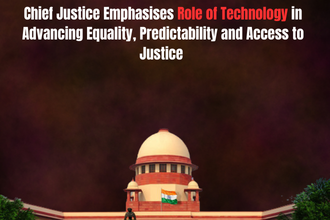In a significant ruling, the Supreme Court has affirmed the dismissal of a judicial officer who was terminated for filing false and malicious complaints against sitting judges of the High Court, senior police officers, and other judicial officers. The case—Prabhakar Gwal v. State of Chhattisgarh & Anr.—raises important issues about judicial propriety, disciplinary procedure, and limits on service recourse.
Background
- Officer’s career trajectory
Prabhakar Gwal began his judicial career as Civil Judge, Class II, in 2005. He was promoted to Class I in 2012, and subsequently posted as Additional Chief Judicial Magistrate (ACJM) in Raipur in 2015. - Allegations and correspondence
While serving as ACJM, Gwal lodged complaints—without High Court sanction—against a sitting MLA and senior police officers, prompting multiple show-cause notices. Concurrently, Gwal’s wife filed criminal complaints against then-Chief Justice Navin Sinha, another High Court judge (Justice P. Diwaker), police officials, toll-plaza employees, and other judicial officers, alleging conspiracy, corruption, and abuses of power. The nature of these allegations was described by courts as “false, scurrilous, malicious,” and repetitively leveled in successive correspondences. - Disciplinary steps and dismissal
In February 2016, a minor penalty of withholding one increment was first imposed. However, in March 2016, the Full Court of the Chhattisgarh High Court concluded that in view of the repeated and grave allegations, it was “not reasonably practicable” to conduct a full departmental inquiry. The Full Court recommended dismissal under Article 311(2)(b) of the Constitution, and the State Government accepted the recommendation. Gwal was dismissed in April 2016. Gwal challenged his termination via a writ petition before the Chhattisgarh High Court. In August 2020, a Single Judge dismissed his petition. On appeal, a Division Bench declined relief as well, holding that this was not a case of one isolated act but a sustained campaign of baseless allegations, thereby justifying dispensation of inquiry. - Supreme Court appeal
Aggrieved, Gwal moved the Supreme Court. His counsel sought an independent inquiry into the complaints, and contended that procedural safeguards had been violated. However, the bench (Justices Vikram Nath and Sandeep Mehta) declined to order a fresh inquiry and upheld the dismissal. The Supreme Court held that Gwal’s conduct revealed he was unfit to hold any public office, particularly a judicial post.
Key Legal and Constitutional Issues
Article 311(2)(b) — Dispensation of inquiry
Article 311(2)(b) of the Constitution allows dismissal or removal of a public servant without a departmental inquiry where “in the interest of the security of the State or for reasons to be recorded in writing, it is not reasonably practicable to hold such an enquiry.” Courts have interpreted this clause strictly.
In this case, both the Full Court and appellate courts held that the volume, nature, and repeated false complaints justified invoking clause (b). The Supreme Court concurred that the record furnished “germane reasons” to dispense with inquiry.
Conduct assessment, fitness, and judicial propriety
A central theme of the judgments is that disciplinary proceedings and service law are not merely about isolated wrongdoing; they also concern whether the officer’s conduct as a whole shows unsuitability for public office.
The Supreme Court remarked, “What kind of allegation is this? … You want to read out aloud? Asking for raids into the house of the Chief Justice” — underlining how unacceptable the allegations were. It held that Gwal’s conduct demonstrated that he was unworthy of any government position, let alone a judicial one.
This emphasis on the character and manner of conduct, particularly regarding attacks on the judiciary, is significant when applied to judicial officers who must preserve the dignity and independence of courts.
Procedural safeguards and right to defense
Gwal’s counsel contended that failure to issue proper show cause notices, denial of documents, and lack of fair hearing violated settled service guarantees. He also claimed that the Single Judge in the High Court had acted in a conflicted role.
The Supreme Court and lower courts found that procedural lapses, if any, were outweighed by the nature and volume of misconduct and the impossibility of a fair inquiry given the antagonistic posture taken by the officer in his correspondence.
Courts have long held that even judicial officers are subject to disciplinary rules and must be held to high ethical standards, and procedural flexibility is permissible when misconduct is manifest and repeated.
Significance and Implications
- Boundary of permissible agitation
The decision illustrates that judicial officers (or any civil servants) cannot resort to unrestrained public or criminal complaints against their superiors or colleagues as a method of grievance. When allegations are baseless, defamatory, or malicious, disciplinary consequences follow. - Precedent for dispensing inquiry in extreme cases
The case reaffirms that in exceptional circumstances—where the allegations themselves show lack of fitness—courts may endorse dispensing with formal inquiry under Article 311(2)(b). - Protection of institutional integrity
The judiciary must remain insulated from frivolous or scandalous attacks by those within its own ranks. This ruling sends a message that misuse of judicial or quasi-judicial office to malign the institution will not be tolerated. - Cautious scrutiny of procedural challenges
While procedural guarantees are important, they may not always be decisive when misconduct is grave, repeated, and uncontroverted. Courts will examine whether procedural irregularities truly affected fairness or are merely peripheral to the core misconduct.
Also Read
Supreme Court Allows Manufacture of Green Firecrackers in Delhi NCR but Prohibits Sale


